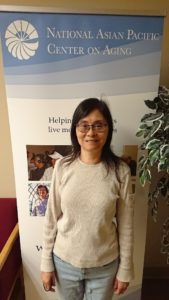While most of Congress is in recess during the month of August, the conference circuit is in full swing. Hot off the heels of n4a’s 43rd Annual Conference & Tradeshow at the beginning of the month, Dr. Eun Jeong Lee, National Asian Pacific Center on aging (NAPCA) Senior Community Services Employment Program (SCSEP) National Director, will again partner with national SCSEP grantees to discuss best practices of the Senior Community Service Employment Program (SCSEP) in serving mature workers and how generational diversity benefits employers.
Dr. Lee and partners are attending the 2019 National Home & Community Based Services (HCBS) Conference in Baltimore this week, sponsored by the National Association of States United for Aging and Disabilities (NASUAD). The presentation will take place on Thursday, August 30 from 10:00am-11:15am Eastern and will engage attendees to understand the issues and challenges in workforce development among diverse older adults, share the best practices of SCSEP in serving mature workers and the benefits to employers.
The number of mature workers in America’s workforce is rapidly increasing. According to the U.S. Bureau of Labor Statistics, the workforce will grow to 164 million workers by the year 2024, and 41 million, or almost 25 percent, of the total workforce will be age 55 years and older. In addition, the aging workforce will be more diverse by culture, ethnicity and race.
SCSEP/Title V of the Older Americans Act is the only federally funded training and employment program for eligible older workers 55 and older. By statute, SCSEP must focus on serving disadvantaged older workers with barriers to employment, including veterans, people with disabilities, limited English proficiency, low literacy skills or homelessness.
SCSEP participants gain work experience in a variety of community service activities at non-profit and public facilities including schools, hospitals, day-care centers, and senior centers. NAPCA and its community partners operate SCSEP in 50 counties in 7 states. For more information, please visit www.NAPCA.org/programs/scsep/.
We highlight the following success story of Ms. Wan Chi “Winnie” Chan who discusses how SCSEP is successful in helping her.
**
 Wan Chi “Winne” Chan
Wan Chi “Winne” Chan
Born: 1956, Hong Kong, China
Arrived in US: 1997 – Seattle, WA
Current Employment: Part Time Data Clerk, Seattle Project, NAPCA SCSEP
Coming to the United States was my childhood dream. My parents and all other members of my family were already in the US. I was lonely so I was really very eager to come and live with them. Finally, after 40 years of waiting, in 1997, I finally was able to come and live with my family in Seattle, WA.
At first, I was afraid that the cultural differences between the two countries will be difficult for me, especially the language barrier. This barrier resulted in my loss of confidence.
In Hong Kong I graduated from high school and only had attended one year of Business College due to health reasons. I worked as an Office Assistant in a primary school in Hong Kong for 20 years.
After arriving in the US 1997, I did not know what I really wanted to do that would suit me. I finally found a cashier and customer service job at a retail store and worked there for 14 years until 2015. From this I discovered that my life must change, but I did not know how to change it and I felt lost and embarrassed.
After more than a year of hopelessness in life, I found the NAPCA SCSEP Program with the help of some friends. The NAPCA SCSEP Program is a job training program to help the elderly. I was given a chance to learn new skills. From June 2016 to July 2018, I learned a lot on how to solve the working needs of other SCSEP participants and to help the elderly, especially the Chinese people with limited English speaking skills. Whether it is different job skills, relationships, etc., I finally found a job that uses my talents and skills.
In August of this year, I was very pleased to get a part time job as a Data Entry Clerk in the SCSEP Program at the NAPCA headquarters in Seattle.
NAPCA gave me back the courage, confidence and hope that I lost. I am very happy today and I will continue my ideals to learn more new things and to help those who needs help.
**
The opinions expressed in this article are those of the author and do not necessarily reflect those of the Diverse Elders Coalition.

